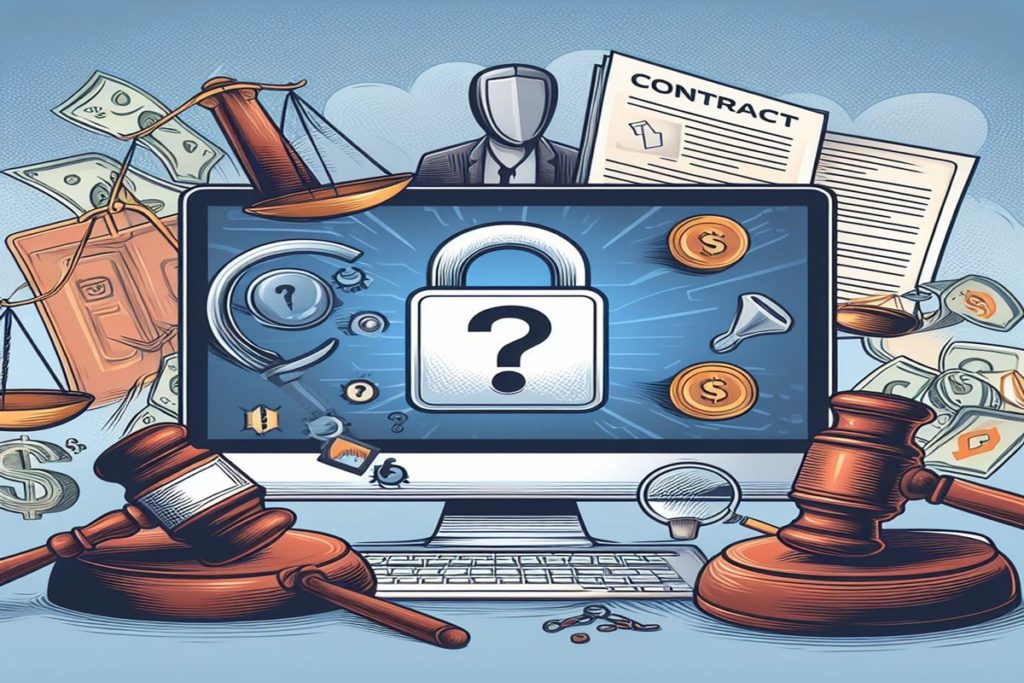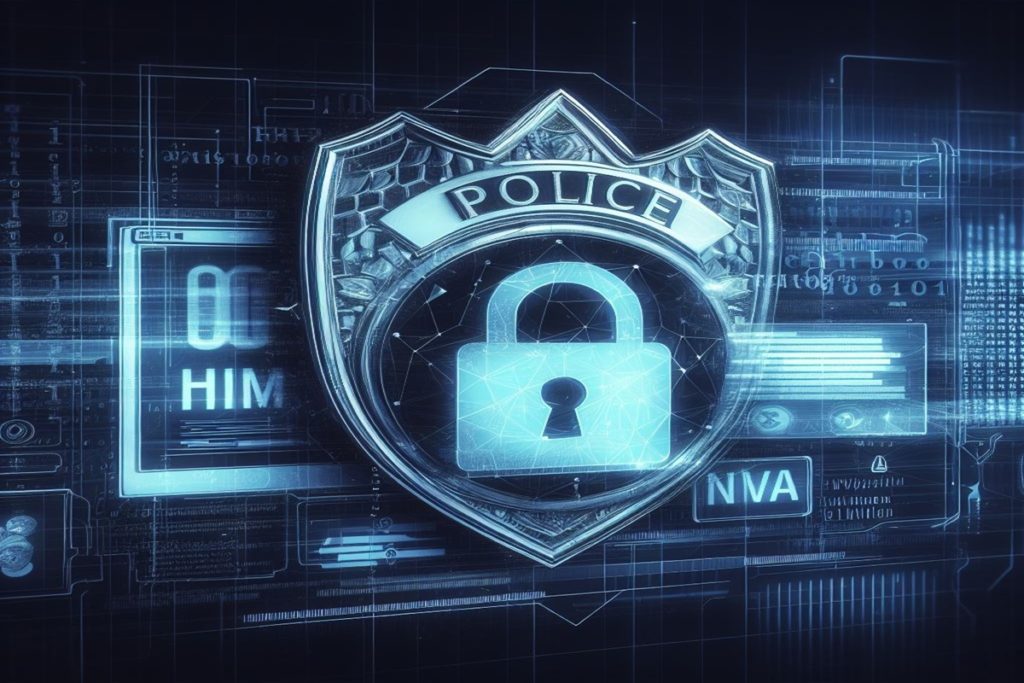In today’s closely interconnected society, the intersection between technology and legal systems is both inevitable and often complex. A prominent topic of discussion in this area is the matter of online privacy concerning law enforcement.
As an expert in the field, I’ve spent years unraveling the intricate dance between privacy rights and legal responsibilities. Where does the individual’s right to privacy begin, and where does it end in the face of maintaining public safety and enforcing the law?
These are not just theoretical questions, but pressing issues that impact real lives, policies, and the delicate balance of justice.
For many, the internet has become a space of freedom, a haven where we express our thoughts, share our lives, and access a world of information at our fingertips.
Yet, it is also a space that is susceptible to crime, necessitating the watchful eyes of law enforcement.
Law enforcement internet privacy is a topic that encapsulates this complex interplay, painting a picture of the challenging task of respecting individual privacy while ensuring that the digital space remains a safe environment for all.
Let’s take a journey to dissect, understand, and perhaps find a middle ground in this intricate and ever-evolving landscape.
Table of Contents
The State of Internet Privacy
As an internet user, I am concerned about the state of internet privacy. With the increasing use of technology, law enforcement agencies have more access to our personal data than ever before. This access raises concerns about the privacy and security of our personal information.
Currently, there are no federal privacy laws regulating many companies, which means they are free to do what they want with our data, unless a state has its own data privacy law. This lack of regulation leaves consumers vulnerable to data breaches and identity theft.
The Electronic Communications Privacy Act (ECPA) has been regulating law enforcement’s ability to access electronic data since 1986.
However, the ECPA is outdated and does not address the current technological landscape. This has led to concerns about law enforcement’s access to personal data without proper oversight.
State laws related to digital privacy vary widely across the United States. Some states have comprehensive consumer data privacy laws, while others only have laws related to specific areas such as website privacy policies or employee email monitoring.
It is important for individuals to be aware of the laws in their state and take steps to protect their personal data.
Law Enforcement and Internet Privacy

Let’s discuss the legal framework that governs law enforcement’s access to personal information online and the challenges and controversies that arise in this context.
Legal Framework
Law enforcement officers are subject to a variety of laws and regulations that govern their access to personal information online.
As mentioned, one such law is the Electronic Communications Privacy Act (ECPA), which regulates the interception of electronic communications, such as email and text messages.
The ECPA requires law enforcement officers to obtain a warrant before accessing the content of electronic communications, except in certain limited circumstances.
Another law that governs law enforcement’s access to personal information online is the Computer Fraud and Abuse Act (CFAA).
The CFAA prohibits unauthorized access to computer systems, and law enforcement officers can use it to prosecute individuals who engage in hacking or other forms of computer-related crime.
In addition to these laws, law enforcement officers are also subject to various agency policies and guidelines that govern their access to personal information online.
For example, many law enforcement agencies have policies that require officers to obtain a warrant before accessing personal information online, except in certain limited circumstances.
Challenges and Controversies
Despite the legal framework that governs law enforcement’s access to personal information online, there are still many challenges and controversies that arise in this context.
One such challenge is the use of third-party data brokers, which sell personal information to law enforcement officers.
These data brokers often obtain personal information from public records and other sources, and law enforcement officers can use this information to conduct investigations.
Another challenge is the use of social media and other online platforms to gather personal information about individuals.
While many social media platforms have policies that prohibit law enforcement officers from accessing personal information without a warrant, these policies are not always effective in practice.
Finally, there is a growing concern about the use of facial recognition technology by law enforcement officers.
Facial recognition technology allows officers to identify individuals based on their facial features, and many civil liberties advocates argue that this technology is a threat to personal privacy.
Implications on Citizens’ Rights
As law enforcement agencies continue to push for greater access to digital data, citizens’ rights to privacy and free speech are increasingly being called into question.
Now I’ll explore some of the key implications of this trend.
Privacy vs Security
One of the main arguments used by law enforcement agencies in favor of increased access to digital data is that it will help them to prevent and solve crimes. However, this argument must be balanced against citizens’ rights to privacy.
While it is true that access to digital data can be a valuable tool in law enforcement, it is also true that this access can be abused. Without proper safeguards in place, law enforcement agencies could use digital data to engage in unwarranted surveillance of citizens, violating their privacy rights.
Impact on Free Speech
Another important implication of law enforcement’s push for greater access to digital data is its potential impact on free speech. If law enforcement agencies are able to access citizens’ digital data without proper safeguards in place, they could use this access to monitor and censor online speech.
This could have a chilling effect on free speech, as citizens may be less likely to express their opinions online if they believe that law enforcement is monitoring their activities.
Technological Aspects of Internet Privacy
As technology continues to evolve, it is becoming increasingly important to understand the various aspects of internet privacy. In particular, law enforcement agencies must be aware of the role of encryption, as well as the use of cookies and trackers.
Role of Encryption
Encryption is the process of converting data into a code to prevent unauthorized access. It is a critical tool for protecting sensitive information, such as personal and financial data.
However, it can also be used to hide criminal activity, making it a contentious issue for law enforcement.
As a result, there is an ongoing debate about the use of encryption and whether it should be subject to government regulation.
Some argue that encryption is necessary to protect individual privacy, while others believe that it can be used to facilitate criminal activity.
Use of Cookies and Trackers
Cookies and trackers are small pieces of code that are placed on a user’s device to track their online activity.
They are commonly used by websites to personalize content and improve user experience. However, they can also be used by law enforcement agencies to collect information about individuals without their knowledge.
There are several types of cookies and trackers, including first-party and third-party cookies.
First-party cookies are created by the website that the user is visiting, while third-party cookies are created by a different website. Both types of cookies can be used to track user activity.
In addition to cookies, there are other types of trackers, such as web beacons and fingerprinting.
Web beacons are small images that are embedded in a website and used to track user activity.
Fingerprinting is a technique that collects information about a user’s device, such as its operating system and browser version, to create a unique identifier.
International Perspectives on Internet Privacy
As the internet has become an increasingly important aspect of our lives, governments around the world have been grappling with how to balance the need for law enforcement with the right to privacy.
Here are two examples of how different countries have approached this issue:
EU’s General Data Protection Regulation
The European Union’s General Data Protection Regulation (GDPR), which went into effect in May 2018, is one of the most comprehensive privacy laws in the world.
It gives individuals greater control over their personal data, including the right to know what data is being collected about them and the right to have that data deleted.
The GDPR also imposes strict penalties on companies that violate the law, with fines of up to 4% of a company’s global revenue.
From a law enforcement perspective, the GDPR presents some challenges. For example, law enforcement agencies may need to access personal data in order to investigate crimes, but the GDPR limits the circumstances under which such access is allowed.
Additionally, the GDPR requires companies to report data breaches within 72 hours, which could make it more difficult for law enforcement to conduct covert investigations.
China’s Cybersecurity Law
China’s Cybersecurity Law, which went into effect in June 2017, takes a very different approach to internet privacy.
The law gives the Chinese government broad powers to monitor online activity and requires companies to store data on Chinese servers.
This has raised concerns about privacy and censorship, as the Chinese government has a history of using its power to suppress dissent.
From a law enforcement perspective, the Cybersecurity Law gives Chinese authorities significant powers to monitor and investigate online activity.
However, this power is often used to target political dissidents and other individuals who are seen as a threat to the government.
Overall, the approaches taken by the EU and China to internet privacy and law enforcement are quite different.
While the GDPR prioritizes individual privacy and places limits on law enforcement access to personal data, the Cybersecurity Law gives the Chinese government broad powers to monitor online activity and suppress dissent.
Future of Law Enforcement and Internet Privacy

As technology continues to advance, the future of law enforcement and internet privacy is a topic of concern for many. Let’s discuss two key areas of focus: emerging technologies and policy recommendations.
Emerging Technologies
Emerging technologies such as artificial intelligence (AI) and the Internet of Things (IoT) have the potential to greatly enhance law enforcement capabilities. However, they also pose significant privacy risks.
For example, facial recognition technology can be used to identify suspects, but it can also be used to track individuals without their knowledge or consent.
To address these concerns, it is important for law enforcement agencies to implement strong privacy protections and transparency measures.
This includes developing clear policies for the use of emerging technologies, as well as providing regular updates to the public on their use.
Policy Recommendations
In addition to implementing privacy protections for emerging technologies, there are several policy recommendations that can help safeguard internet privacy for all individuals.
These include:
- Strengthening data protection laws: Governments should enact stronger data protection laws that require companies to obtain explicit consent from individuals before collecting, using, or sharing their personal data.
- Increasing transparency: Companies should be required to provide clear and concise privacy policies that explain how they collect, use, and share personal data.
- Empowering individuals: Individuals should have the right to access, correct, and delete their personal data. They should also have the right to opt-out of data collection and sharing.
- Enhancing cybersecurity: Governments and companies should work together to enhance cybersecurity measures and protect against data breaches.
The Final Word
As we wrap up this exploration into law enforcement internet privacy, it’s clear that we are navigating a nuanced and complex landscape. Striking a balance between individual privacy and the imperative to maintain public safety is no small feat. As our digital footprints expand, so too does the imperative for a discourse that is as evolving and dynamic as the technology it seeks to regulate.
Every byte of information that zooms across the ether opens up new possibilities – and challenges – for both privacy and security. Law enforcement agencies, armed with advanced technologies, play a pivotal role in harnessing the power of the internet to counteract cybercrime. However, this comes with the solemn responsibility of upholding the sanctity of individual privacy.
In the unfolding narrative of law enforcement internet privacy, each one of us is a stakeholder. As technology continues to advance at breakneck speed, creating opportunities and challenges alike, revisiting, reevaluating, and refining our approach to privacy and security becomes not just desirable, but absolutely essential.
Our collective ethos, legal frameworks, and technological innovations must work in concert to create a digital world that is as safe as it is free. In this intricate dance, every step, every move counts. The conversation is ongoing, and your voice, dear reader, is a crucial part of it.
Law Enforcement Internet Privacy FAQs
How do law enforcement agencies protect online privacy?
Law enforcement agencies protect online privacy by implementing strict security measures to ensure that sensitive information is not accessed by unauthorized personnel. These measures include the use of encryption, firewalls, and other security protocols to safeguard confidential information.
What are the benefits and drawbacks of facial recognition technology in policing?
Facial recognition technology has the potential to enhance public safety by helping law enforcement agencies to quickly identify suspects and prevent crimes. However, there are concerns about the accuracy of the technology and the potential for it to be used to infringe on individual privacy rights.
What is police surveillance and how is it regulated?
Police surveillance refers to the monitoring of individuals or groups for the purpose of preventing or investigating criminal activity. It is regulated by federal and state laws, which require law enforcement agencies to obtain warrants before conducting surveillance and to adhere to strict guidelines to protect individual privacy rights.
Can law enforcement access personal data from online accounts?
Law enforcement agencies can access personal data from online accounts, but only under certain circumstances. For example, they may be able to obtain a warrant to access information from social media accounts if it is relevant to an ongoing investigation.
What is the role of online security tools in law enforcement?
Online security tools play a critical role in helping law enforcement agencies to protect sensitive information and prevent cybercrime. These tools include antivirus software, firewalls, and intrusion detection systems, which help to detect and prevent unauthorized access to computer networks and systems.
How do law enforcement agencies track internet activity?
Law enforcement agencies use a variety of techniques to track internet activity, including monitoring internet traffic, analyzing metadata, and conducting surveillance of online communications. These techniques are used to investigate criminal activity and to prevent cybercrime.
- Rights & Ranks: Law Enforcement Internet Privacy - February 26, 2026
- Best Antivirus for Gaming PC: Top Picks for Optimal Protection - February 26, 2026
- How to Use VPN with YouTube TV: A Quick and Easy Guide - February 26, 2026










